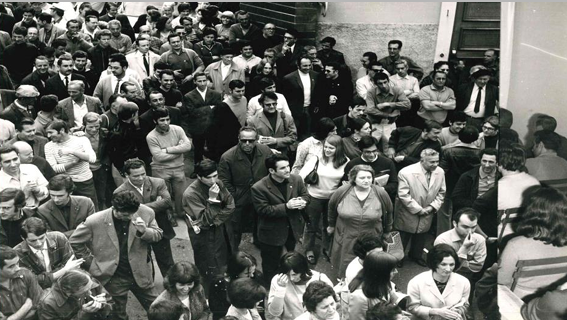Trade union history in the Principality: 80 years of struggle and progress

This year, the Union des Syndicats de Monaco (USM – Monaco Trades Union) is celebrating its 80th anniversary, an ideal opportunity to look back on the Principality’s social history.
Founded on 6 October 1944 during the euphoria that followed the Liberation, the USM has endured the decades as the primary channel for employees to advocate for their rights. It currently comprises 43 trade unions.
Created at a time of rebuilding
The USM was founded in the wake of Monaco’s Liberation. Communist ideas were widespread in the Principality immediately after the Liberation, and employee trade unions were authorised on 6 October 1944 by ordinance. The civil servants’ unions followed on 11 November and employers’ unions were authorised on 28 November. All trade union activity had previously been banned. The government made available the former symbolic Fascist headquarters, the Casa Italiana, as premises for the new organisation.
The early years laid the foundations for Monaco’s social services. Between 1944 and 1948, the USM obtained the creation of staff representatives, twelve public holidays, collective labour agreements and an independent pension fund.
Social progress in the 1960s
After a conflictual period in the 1950s, marked by anti-strike laws and attempts to divide the unions, the 1960s brought more favourable developments.
In 1962, trade union rights were enshrined in Monaco’s Constitution. The decade also saw structural reforms, such as the creation of a supplementary pension scheme in 1963 and improved pay conditions and a minimum wage at least in line with those available in Nice, as well as paid public holidays.
In May 1968, France’s social upheavals were echoed in the Principality. The strikes and demonstrations organised in Monaco led to significant advances, including an across-the-board pay increase, the introduction of a social fund and housing benefits, among others.

The 80s and a swing of the pendulum
From the 1980s onwards, the context changed as free-market policies emerged. The anti-strike law passed in 1980, although it was quickly repealed on constitutional grounds, showed a desire to curb trade union activity in favour of corporate freedom. Like Europe, the Principality turned towards the tertiary sector, and particularly luxury real estate and a strong financial centre.
Although the USM protected French employees in Monaco from CSG contributions in 1994, it did not manage to safeguard the 1945 and 1963 wage legislation in the 2000s, leading to an earnings loss of 11.43%, according to the USM.
An unsure but resolute future
80 years on, the USM and the different trade unions defended many social advances that would seem to be enshrined for all workers in the Principality. However, the USM continues not only to defend existing employee rights, but also to develop new rights such as the introduction of grounds for dismissal, as per the famous Article 6, which would provide better protection for employees.
Its affiliation to the World Federation of Trade Unions in 2018 shows a desire to add an international dimension to its action, while remaining focused on local issues. In particular, the organisation is calling for a fairer distribution of wealth and for a concerted reflection on changes to society.













